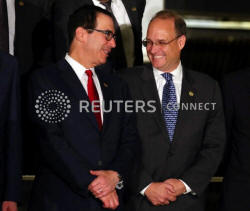|
The
FATF is an inter-governmental organization that underpins the
fight against money laundering and terrorism financing by
setting global standards and checking if countries respect them.
The European Commission earlier this month increased the number
of countries on its list to 23 from 16, adding Saudi Arabia,
Panama and four U.S. territories in a move that was criticized
by some EU countries like Britain.
After chairing a FATF meeting in Paris, Marshall Billingslea,
the U.S. assistant Treasury Secretary for terrorist financing,
said that a number of member countries had expressed "grave
concern" about the EU list.
"Black and grey lists are always highly sensitive issues and
they have to be handled carefully and they should only be
elaborated on a robust and transparent methodology," he told
journalists after the meeting.
He said that the FATF spent tens of thousands of hours working
against money laundering and the financing of terrorism, and
insisted that the body played the "central role" on the issue.
"There are obvious questions as to whether (a) list elaborated
outside of the FATF, or without our involvement or help, helps
or undermines this leading role of our organization," he added.
Criteria the European Commission used to blacklist countries
include weak sanctions against money laundering and terrorism
financing, insufficient cooperation with the EU on the matter
and lack of transparency about the beneficial owners of
companies and trusts.
(Reporting by Leigh Thomas; editing by Richard Lough
[© 2019 Thomson Reuters. All rights
reserved.] Copyright 2019 Reuters. All rights reserved. This material may not be published,
broadcast, rewritten or redistributed.
Thompson Reuters is solely responsible for this content.

|
|





